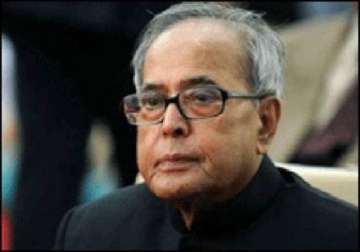Crisis Looming, Think Out-Of-The-Box: Mukherjee To World Bank
Washington, Sep 25 : Indian Finance Minister Pranab Mukherjee on Saturday said the World Bank needs to find ways to improve its capital base so that it can enhance lending to developing countries, underlining that
Washington, Sep 25 : Indian Finance Minister Pranab Mukherjee on Saturday said the World Bank needs to find ways to improve its capital base so that it can enhance lending to developing countries, underlining that with another crisis looming, prioritisation of activities is the need of the hour.
At the top of the World Bank's list of priorities should be to address its lack of financial capacity, as well as that of the International Finance Corporation, and work toward a strong capital base as well as find creative ways to expand lending and investment in developing countries, Mukherjee said.
The World Bank's focus needs to be on critical areas such as poverty alleviation, food price inflation, financing for climate change and meeting the energy needs of the poor, he stressed.
“The International Development Association (IDA) needs to be put on a more sustainable footing, with donors giving priority to IDA over Trust Funds and also without weakening the resources of the International Bank for Reconstruction and Development (IBRD) and IFC,” Mukherjee said in his intervention during the World Bank's Development Committee meeting on Global Development Issues and the World Development Report 2012 on Gender.
Asking the World Bank to give priority to upliftment of the poor, wherever the poor may be, without getting diverted by peripheral goals, Mukherjee reiterated the need to address the needs of middle income countries (MICs), which were the main borrowers from the IBRD.
“They often feel disconnected from many bank activities. Efforts should be made to regenerate interest in MICs toward the bank, particularly through enhanced financing, more knowledge products and a focus on the poor in MICs,” he said.
Stating that food price inflation needs to be tackled on a priority basis, he said this would require both short-term measures focusing on immediate food supply and safety nets and long-term measures to enhance agricultural productivity and output.“The bank will have to make substantial investment in this regard,” he said.
Mukherjee also evinced a need to generate additional and new finance for climate change, along with measures to encourage transfer of technology to developing countries.
“Meeting the energy access needs of the poor is going to be a severe test for the bank. While climate concerns are legitimate, providing access to energy for the poor is a priority far more important than sustaining energy intensive lifestyles,” he said.
Noting that global financial leaders are meeting at a difficult time for the global economy and there are indications that the world could be engulfed in another economic crisis, with serious repercussions for the poor and vulnerable, Mukherjee said in such circumstances, they need to be prepared to “think out-of-the-box” and deliberate over what are the important issues the World Bank should be addressing today.
“The response of the World Bank Group to the last crisis was exemplary. The record lending by IBRD was what made the crucial difference. We firmly believe that the most effective crisis response is expanded lending to and investment in developing countries,” he said.
“However, as we stand at the brink of a recession and continue to hope that we will avert it, we are worried about the lack of adequate financial capacity in the bank. Our concern is that when a new crisis unfolds, the IBRD and the IFC will be mute spectators,” he said.
Mukherjee said a level of USD 15 billion of annual lending by the World Bank will be inadequate to meet even the normal needs of development finance of developing countries.PTI
